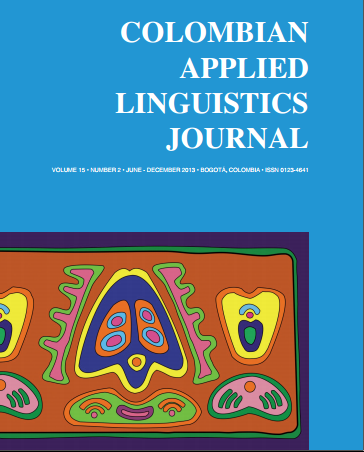DOI:
https://doi.org/10.14483/udistrital.jour.calj.2013.2.a05Published:
2013-07-01Issue:
Vol 15, No 2 (2013) July-DecemberSection:
Research ArticlesEl habla como expresión de la cultura popular*
Speech as an expression of popular culture
Keywords:
popular culture, speech, language, social representations (es).Keywords:
cultura popular, habla, lenguaje, representaciones sociales (en).Abstract (en)
Este artículo presenta resultados de una investigación cualitativa con jóvenes de la ciudad de Bogotá, Colombia, cuyo objetivo fue comprender las representaciones sociales implícitas en sus expresiones cotidianas y cómo estas expresiones construyen y transforman la cultura popular con base en la aplicación de encuestas y la producción de textos escritos. El trabajo se enmarca en una perspectiva lingüística y sociológica y se realizó con cien estudiantes de un colegio de Bogotá cuyas edades oscilaban entre los 14 y 17 años de edad. Los resultados de la investigación mostraron que las representaciones sociales de los jóvenes bogotanos, presentes en sus expresiones cotidianas, tienen que ver con valores preestablecidos socialmente, con formas utilizadas para configurar su identidad como individuos y como miembros pertenecientes a algún grupo social y, con las ideas acerca de cómo comportarse o relacionarse con otros. La cultura popular, con la oposición de los jóvenes a lo establecido, manifiesta a través del uso informal del lenguaje y la creación de palabras carentes de los requisitos necesarios para ser consideradas como propias de la cultura superior. En este sentido, se constató la mediación de la cultura superior en la existencia de la cultura popular.
Abstract (es)
This article represents the outcomes of a qualitative research applied to teenagers from the city of Bogota, Colombia. The objective of this research is to understand the social representations implicit in their everyday expressions, and how these representations construct and transform popular culture, based on survey application and production of written texts. This work is developed from a linguistic and sociological perspective, and was performed with one hundred students from a school in Bogota, whose ages ranged between 14 and 17 years. The results of this research have shown that the social representations of teenagers in Bogota, which are common in their daily expressions, are concerned with social presets, the ways they use to set their identity as individuals belonging to a specific social group, and also with the ideas they have about how to behave and interact with others. Popular culture with youth opposition to the established, is manifested through the informal use of language and the creation of words without the necessary requirements to be considered as belonging to the high culture. In this sense, mediation of this high culture was found in the existence of popular culture.
References
Abric, J. (1994) Prácticas y representaciones sociales.
México: Ediciones Coyoacán.
Bajtin, M. (1997) La palabra en la vida y la palabra en
la poesía Hacia una poética sociológica. Hacia una
filosofía del acto ético. De los borradores y otros
escritos (Traducción del ruso de Tatiana Bubnova).
España: Editorial Anthropos.
Burke, P. (1996)Hablar y callar: funciones sociales del
lenguaje a través de la historia(Traducción Alberto
L. Bixio) Barcelona: Editorial Gedisa.
García, N, (1989). La crisis teórica en la investigación
sobre cultura popular Homines, (6)
Fernández, A. (2002). Estereotipos y roles de género en
el refranero popular.Barcelona: Editorial Anthropos.
Montes, J. (1998).El español hablado en Bogotá: Análisis
previo de su estratificación social. Bogotá: Instituto
Caro y Cuervo.
Mugny G., Carugati F., (1985) L ‘intelligence au pluriel:
les représentatíons sociales de I ‘íntellígence et de
son développement. Cousset: DelVal.
Zubieta, A., Blanco, O, Domine, M., Gómez, M., Imperatone, A., Montes, A. y Soriente, M. (2000).Cultura
popular y cultura de masas. Conceptos, recorridos
y polémicas. Granada. Editorial Paidós.
How to Cite
APA
ACM
ACS
ABNT
Chicago
Harvard
IEEE
MLA
Turabian
Vancouver
Download Citation
Metrics
License
This work is licensed under a Creative Commons Attribution-NonCommercial-NoDerivatives 4.0 International License.
Attribution — You must give appropriate credit, provide a link to the license, and indicate if changes were made. You may do so in any reasonable manner, but not in any way that suggests the licensor endorses you or your use.
NonCommercial — You may not use the material for commercial purposes.
NoDerivatives — If you remix, transform, or build upon the material, you may not distribute the modified material.
The journal allow the author(s) to hold the copyright without restrictions. Also, The Colombian Apllied Linguistics Journal will allow the author(s) to retain publishing rights without restrictions.









